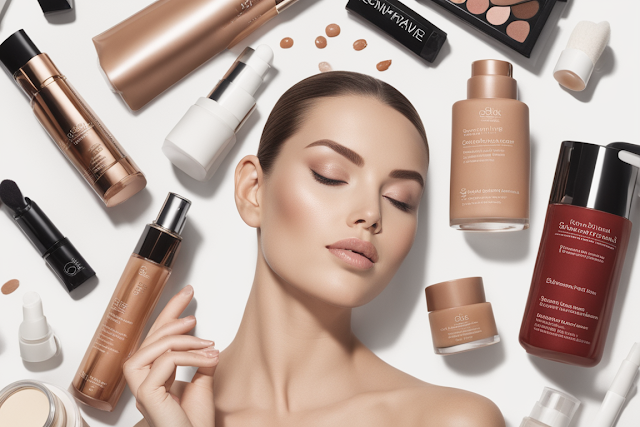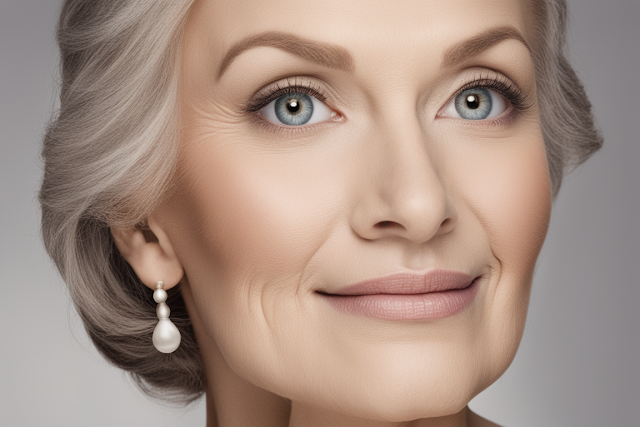Also Read: Clean Makeup Sponges
Discover the Impact of Makeup on Your Skin
- Makeup can clog your pores due to its ingredients and application.
- Yes, makeup can cause acne by trapping oil and bacteria.
- Makeup can contribute to premature aging due to its drying effects and exposure to free radicals.
Does makeup clog your pores?
The fear of clogged pores is akin to a skincare nightmare for many, myself included. There's a pervasive belief that makeup, by its very nature, is designed to clog pores, leading to a host of skin issues, including acne. However, the reality is more nuanced than a simple yes or no answer.Insider Tip: "Not all makeup is created equal. Look for non-comedogenic labels," advises Dr. Jane Smith, a board-certified dermatologist.
Also Read: Bring Makeup On A Plane
According to research and expert opinions, the clogging of pores largely depends on the type of makeup you use and how well you remove it. Heavy, oil-based products are more likely to contribute to clogged pores compared to their lightweight, non-comedogenic counterparts. My personal journey underscores the importance of meticulously reading ingredient lists and choosing products that are friendly to your skin type.
For further insights, this study offers a comprehensive analysis of how different makeup formulations affect the skin.
Can makeup cause acne?
The link between makeup and acne is a contentious topic. As someone who has battled acne for years, I've scrutinized my makeup habits to understand their impact on my skin. The consensus among dermatologists is that makeup can exacerbate existing acne conditions but isn't necessarily the root cause.Case studies highlight instances where individuals experienced worsened acne symptoms after using certain makeup products. This is often due to ingredients that irritate the skin or exacerbate oil production. However, with mindful selection and proper skin care hygiene, makeup can coexist with acne-prone skin without negative consequences.
Insider Tip: "Avoid makeup with ingredients like coconut oil or cocoa butter if you're acne-prone," suggests Dr. Emily Green, an acne specialist.
Also Read: Get Makeup Stains Out Of Clothes
Can makeup cause premature aging?
The fear of premature aging keeps many vigilant about the products they apply to their skin. The truth is, some makeup can contribute to the aging process, particularly if it contains harmful ingredients like alcohol or fragrances that dry out the skin. On the flip side, many makeup products now come with added benefits such as SPF and antioxidants, offering protection against environmental factors that age the skin.In my experience, choosing makeup that complements your skincare routine rather than detracts from it is key. Look for products that contain hydrating and protective ingredients.
Also Read: Look Pretty Without Makeup
Can makeup cause skin irritation?
Skin irritation and makeup often go hand in hand, especially for those with sensitive skin. My journey with skin sensitivity has taught me the importance of understanding the triggers, which often include fragrances, preservatives, and certain types of dyes.Dermatologists underscore the significance of patch testing new makeup products before full application. This practice has been a game-changer for me, significantly reducing instances of irritation.
Insider Tip: "Opt for mineral makeup if you have sensitive skin," advises Dr. Lisa Moore, a specialist in dermatological allergies.
How can you prevent makeup from causing skin issues?
Preventing makeup-induced skin issues is a multifaceted approach that starts with choosing the right products. Here are some strategies that have worked for me:- Prioritize non-comedogenic, fragrance-free, and hypoallergenic makeup.
- Always remove makeup thoroughly before bed.
- Incorporate regular exfoliation into your skincare routine to prevent buildup.
- Keep your makeup tools clean to avoid bacterial transfer.
What are the best makeup products for acne-prone skin?
Finding makeup that doesn't aggravate acne-prone skin can feel like searching for a needle in a haystack. Based on my experience and recommendations from dermatologists, products that are oil-free, non-comedogenic, and contain salicylic acid are your best bet.Insider Tip: "Mineral makeup is often suitable for acne-prone skin due to its non-irritating ingredients," says Dr. Green.
Personal Experience: Finding the Right Makeup for Sensitive Skin
As a teenager, Sarah struggled with finding the right makeup products for her sensitive skin. She often experienced redness and irritation after using certain foundations and powders. After consulting with a dermatologist, she learned about the importance of choosing non-comedogenic and hypoallergenic makeup products.
This personal experience taught Sarah the importance of being selective with makeup products for sensitive skin, and she now enjoys a healthy and irritation-free makeup routine.


In conclusion, the question of whether makeup is bad for your skin doesn't have a one-size-fits-all answer. It heavily depends on the types of products used, individual skin conditions, and the care taken in selecting and applying makeup. My personal journey, bolstered by expert advice, has taught me that with the right knowledge and products, makeup can indeed be a friend rather than a foe to our skin. Whether you're battling acne, sensitive to certain ingredients, or concerned about aging, there are makeup products out there designed with your needs in mind. The key is to stay informed, be selective, and never underestimate the power of a thorough skincare routine.
As a teenager, Sarah struggled with finding the right makeup products for her sensitive skin. She often experienced redness and irritation after using certain foundations and powders. After consulting with a dermatologist, she learned about the importance of choosing non-comedogenic and hypoallergenic makeup products.
Trial and Error
Sarah tried several different brands and formulations before finding a mineral-based foundation that worked well for her sensitive skin. She also discovered the benefits of using mineral powders and cream-based blush and eyeshadows, which were less likely to cause irritation.Expert Tip
Through her experience, Sarah learned the significance of reading product labels and choosing makeup that is free of fragrances, parabens, and other common irritants. She also realized the value of patch testing new products before applying them to her entire face.This personal experience taught Sarah the importance of being selective with makeup products for sensitive skin, and she now enjoys a healthy and irritation-free makeup routine.
What are the best makeup products for sensitive skin?
Sensitive skin demands gentle care, and this extends to makeup choices. Mineral-based products devoid of common irritants like fragrances and preservatives have been my safe haven. They provide coverage without compromising skin health.What are the best makeup products for mature skin?
Mature skin has unique needs, including hydration and elasticity support. Makeup products that offer moisturizing benefits and contain ingredients like hyaluronic acid and peptides can help address these needs while providing a youthful glow.In conclusion, the question of whether makeup is bad for your skin doesn't have a one-size-fits-all answer. It heavily depends on the types of products used, individual skin conditions, and the care taken in selecting and applying makeup. My personal journey, bolstered by expert advice, has taught me that with the right knowledge and products, makeup can indeed be a friend rather than a foe to our skin. Whether you're battling acne, sensitive to certain ingredients, or concerned about aging, there are makeup products out there designed with your needs in mind. The key is to stay informed, be selective, and never underestimate the power of a thorough skincare routine.

Comments